The Third Wife (2018)
Directed by: Ash Mayfair
Written by: Ash Mayfair
Starring: Long Le Vu, Nguyen Phuong Tra My
Vietnam
AVAILABLE ON DUAL FORMAT BLU-RAY:19TH AUGUST, from EUREKA ENTERTAINMENT
RUNNING TIME: 96 mins
REVIEWED BY: Dr Lenera, Official HCF Critic
Late 18th Century, Vietnam. At age 14, May is sent to marry the much older Hung. On arrival, she’s welcomed by Hung’s other two wives. The first, Ha, is the most favoured, due to her only child, Son, the sole male child of the family, approaching adulthood himself. The second, Xuan, is out of favour, having produced three daughters but no sons. All women here are constrained by a parochial system that determines who they marry and where they live. When she gets pregnant after her first night with Hung, May becomes the favoured wife, but she finds herself increasingly drawn to Xuan.…
I’m sure that it’s totally unintentional, but HCF’s friends at Eureka Entertainment seem to be going through a phase of releasing films that are hard to watch. Granted, I don’t keep up very well with disc releases, and we don’t get sent screeners of everything [if we did then Bat and I would struggle to find the time to do anything besides review movies], but The Incident, a searing commentary on the America of 1967 and a passionate attack on those who do nothing while criminal and even violent acts are taking place in front of them, wasn’t easy viewing in places. It was also a quality movie, as is the film from Eureka that I will review next week after a mini break, a film which is even more uncomfortable. And then for now we have The Third Wife. It may not contain any acts of violence [though some may consider sex with a child to be pretty much an act of violence], and is absolutely gorgeous to look at, yet I found it quite difficult viewing throughout. It continues the current trend of examining the place of women in a male-dominated society, but most of these films have a heroine who breaks the mold and rebels. What makes Ash Mayfair’s film so upsetting is that, despite taking place in a society which is truly horrible, none of its female characters try to change things. The sole act of rebellion is by a very young girl who refuses to eat. Well, children do often have an ability to see the wood for the trees, and I would imagine especially so in a society based on heavy conditioning. But in this strange variation on a prison movie, nobody escapes.
If that sounds like I’ve given away the ending, don’t worry, I haven’t at all. But I needed to emphasise how upsetting this film is, a film that ought to make you feel angry even if you haven’t got a pro-feminist bone in your body and are maybe fed-up with the way Hollywood tries to ram feminism down your throat. Concerning the latter – well, I know I am. Political correctness has a lot to answer for, and if you’re familiar with my reviews then you’ll probably know my dislike for it. But think about this. The Vietnamese society depicted in the film that existed some time ago [but not that long ago if you think about it] is a society totally ruled by men. Women are little more than objects, existing simply to please men and bare them children. Of course it’s considered far better if these children are boys. As soon as a girl reaches the age of 14, she’s considered marriage material, but of course it’s the men who decide who she marries. We don’t learn anything of May’s background, but I think it’s highly likely that she came from a poor family, and that her parents sold her to the rich Hung because they were struggling financially. And then there’s one character who is rejected by her husband-to-be, but is then blamed for not completing the “only duty of a wife”. Huh? Females in this really rather alien world have no say whatsoever in their life and have the decks always stacked against them. They’re trapped in a deadening cycle of imprisonment, servitude and what is basically sexual abuse, unless you consider an adult having sex with a child to be an okay thing. Yet one of the many triumphs of Mayfair’s film is that it often finds a sad beauty in the sad existence of its female protagonists. After all, the centuries of conditioning have been so strict that they just don’t know any different. I’m sure that some viewers will wonder why there isn’t some real rebellion, but they would miss the tragic point being made – the female characters probably wouldn’t even consider it.
The first of many lovely shots opens the film, the camera panning up from reflections in a river to the river itself where, as the camera rises to show the mountains on either side, we can just make out two boats containing some people dressed in bright red, the vibrancy of the colour standing out against all that blue and green which surrounds it. 14 year old May is on her way to her new home. Her new family including the other two wives of Hung stand ready to welcome her, though she understandably keeps to herself during the lavish meal that follows. Cut to her sitting on a bed waiting for her husband on their wedding night, and a heartbreaking close-up of her face full of anxiety. She carries out some ritualistic eating of some egg yolk, some of which is allowed to slip from the spoon onto her body, coming to rest at her navel. Now we see that Hung is leaning over her, and he slurps the egg yolk into his mouth from her navel . He’s now taken ownership of her, and the next shot is of May’s shocked face as this adult “enters” this child. There was controversy in Vietnam of star Nguyen Phuong Tra My being only 13 yet appearing in decidedly adult scenes, so much so that the film was withdrawn from release. And there would probably be controversy if the film was made in this country too. But the wedding night sequence, while still disturbing, emphasises symbolism and handles an “icky” situation with great restraint. This sets the tone for the rest of the film. Sex and sexuality play a major part, but subtlety is usually present. And, even when May witnesses intimacy, the director takes care to never place Tra My in the same shots as the people she’s watching.
An early meal scene perhaps sets out best the way things are. Xuan, the second wife who – horror or horrors – could not bare him a son, just three lovely daughters Lien, Nang and Baby Dove – asks if she can buy some gowns for the girls. Hung says no to this because Son, the offspring of Hung and Ha, needs a new horse. This is excepted with obvious sadness but immediate resignation that this is the way things are done. Nobody thinks to object. One can only imagine the punishment that could be dished out if one of the females did, especially when we later see Hung beating a male servant who had a child out of wedlock with another slave. May manages to get on very well with Lien and Xuan. The latter suggests that she pleasure herself, leading to this heartbreaking exchange: “When he’s inside me, I only feel pain”. “Just pretend that you like it, so that he will like it. One day you will like it for real”. Also desperately sad is when Baby Dove says that she wants to be a man when she grows up. She already sees that men have all the freedom and the power. However, stuff does go on that Hung doesn’t know about. May soon notices that Xuan is sneaking off to have sex with Son in the forest. It’s curious, this relationship. Who made the first move? You’d think that it would be Son and that Xuan just had to comply. After all, when Son drunkingly enters her room, the first thing May thinks to do is to begin to take off her clothes. Yet Son thinks he loves Xuan, a love which certainly isn’t reciprocated. Maybe she’s using him? There’s quite a lot in this movie where we’re left to fill in certain details. It’s sometimes frustrating. May starts to harbour feelings for Xuan. Maybe you can work out whether they’re returned. I couldn’t. In fact Xuan is something of a mystery throughout, unlike Ha who we get a bit closer to. Considering the care taken with most aspects of this film, I’d say that this was intentional.
I’m not sure that a subplot of Ha not wanting to marry the person chosen for him is handled all that well, even if it leads to deep tragedy. But I guess it reinforces how male-dominated this society is when it’s a man who commits a major act of disobedience. The leisurely pacing may put a few viewers off [but then I’m sure you know by now if this film is for you or not], but I was consistently absorbed, even if I’m going to be honest here and admit that The Third Wife didn’t seem that appealing to my particular tastes when it arrived through my letterbox. You’re allowed to get a feel feeling for the rural locale while the relatively low amount of dialogue, along with the often exquisite cinematography by Chananun Chotrungroj who is able to give us some lovely compositions despite some rather excessive and obvious green and blue colour correction being employed, make for an often genuinely contemplative experience. Quite often the camera is observing things from a distance just as May would, through partial barriers such as pillars. Bedroom scenes tend to be shot through see-through curtains, giving them a hazy, dreamy look. Some might say that this softens the harshness a little. More might wonder for a while why we every now and again cut to caterpillars, cocoons, and butterflies, the first instance of this being just after May has been “penetrated” for the first time. I’m not sure that it was necessary, but I guess that, as well as reinforcing the silk harvest that’s the source of Hung’s wealth, it emphasises the way that the horrific trauma of May’s first sexual experience could produce something beautiful, and strengthens a “circle of life” aspect. As with anywhere else, life goes on and creates new life – only of course here there’s a real depressing aspect to it all.
The film’s final moment is decidedly morally wrong and will rub some up the wrong way, but was definitely the right way to conclude things. After all, it’s probably what would have happened. I doubt that, if made in Hollywood, it would have ended like this, while we’d probably have also had some female empowerment stuff, plus a harsher portrait of the male characters. However, that would have been wrong. These women are so restricted that it probably doesn’t even enter their minds to be “empowered”, while the men, despite their control over the women being so very wrong and downright abusive in several ways, aren’t really bad guys per se, they’re also products of a very old system and of conditioning. While the scene where Hung orders May to kneel and crawl towards him is as flesh crawling as any horror movie moment I’ve seen this year, Hung isn’t really demonised. We never learn much about him, and for me personally, I’d have liked to have been taken closer to some of these characters – yet despite this “distance” I was still made to feel the terrible pain of the existence of these women. And Try May is extraordinary as May. She’s incredibly “interior” for a child performer, slightly varying emotions on her face often being relied on, and that’s just right, because the character she’s playing would rarely even know how to let it all out. Despite the setting and the unavoidable art-house vibe, I think that the issues presented by Mayfair [in her feature film debut] in The Third Wife will fascinate and disturb many, especially in the current climate. I’ll be keeping a close eye on what she does next.
Rating: 









The Third Wife can’t really hide its digital origins on Blu-ray. The picture is spotlessly clean and very sharp, but lacks contrast at times. That colour correction has really been boosted up! But it’s not a huge issue and you’ll hopefully get so involved in the drama that you eventually won’t care. The sound is well balanced, though I would have liked some subtitles for the [presumably] folk songs heard in places through the film.
The Third Wife is upsetting yet subtle and contains much beauty. While the disc doesn’t contain any special features except for a trailer, Eureka’s release still comes Highly Recommended.
SPECIAL FEATURES
*1080p presentation on Blu-ray (with a progressive encode on DVD)
*Optional English subtitles
*Theatrical Trailer
*A booklet featuring a new essay by David West, news editor at NEO magazine

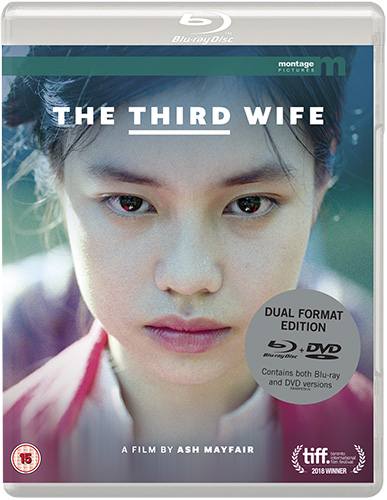
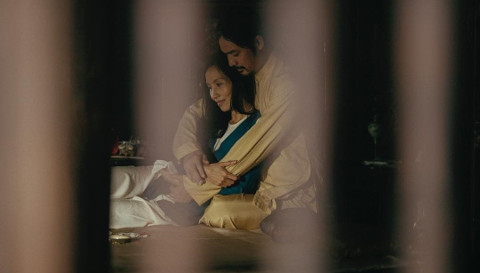
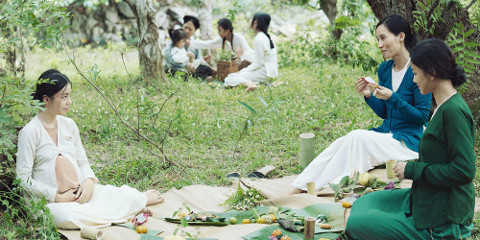

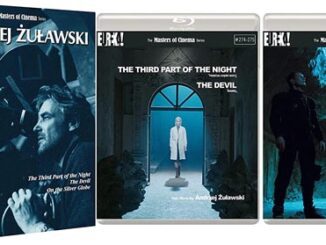
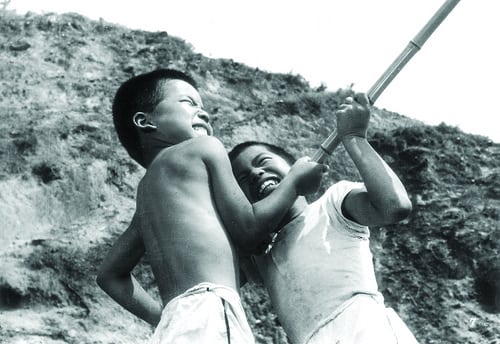
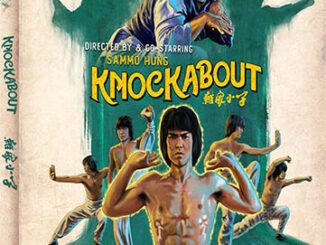
Be the first to comment